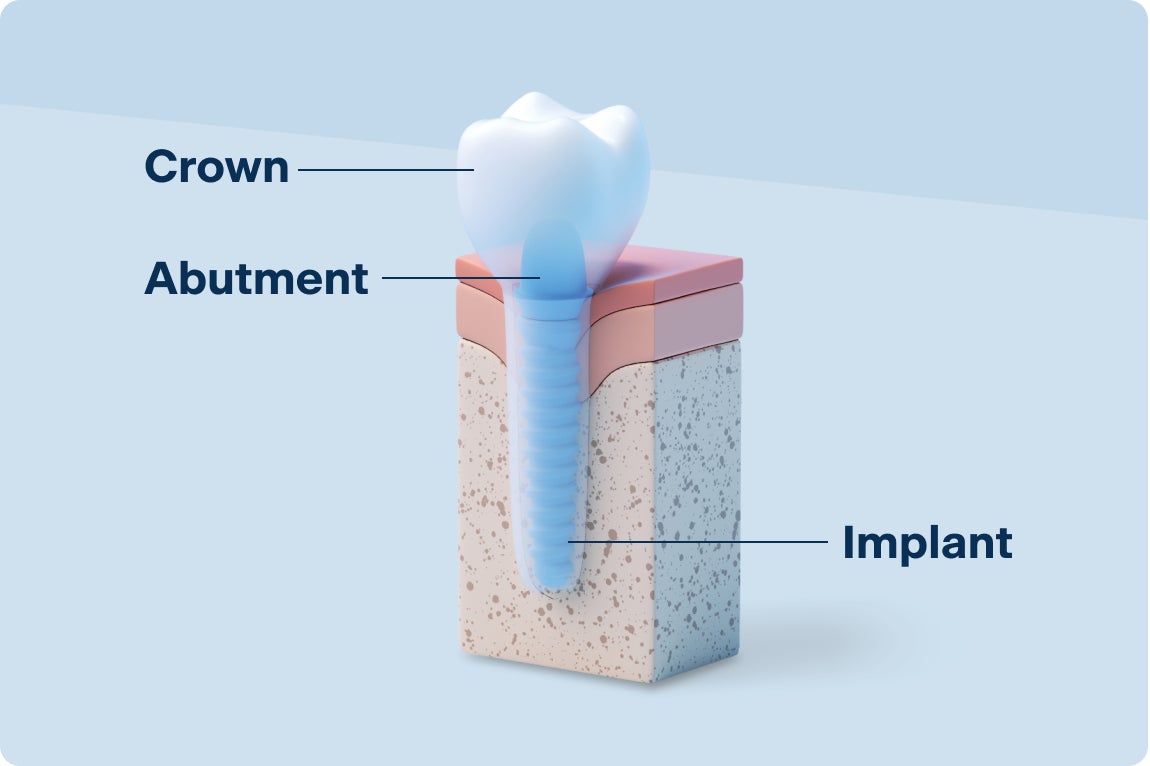Last updated 11.06.2025
What is a dental implant (post)? The foundation of your new smile
How the implant post supports the abutment and crown, and how timing is planned from placement to final restoration.

Learn more about Dr. Siam Zokaie

Smiles built for life start with a strong foundation. At ClearChoice, that foundation is created with titanium dental implants. This guide will walk you through the role of the implant post, from initial placement to supporting your final teeth.
What is a dental implant?
A dental implant is a small, durable, screw-like post surgically placed into your jawbone. It acts as a replacement for the natural tooth root you've lost, serving as a strong and stable foundation for the attachment of your new tooth.

The actual dental implant is only the beginning of the process. Whenever an implant is placed in the bone, the goal is to achieve a complete dental implant restoration to replace and allow full function of the missing tooth. This restoration is a three-part system:
The implant: The titanium screw that integrates with your jawbone
The abutment: A connector piece that attaches to the top of the implant
The crown or prosthesis: The visible, tooth-shaped prosthetic that fits onto the abutment
One implant can support one missing tooth. When several teeth in a row are missing, multiple implants are placed and the dentist can connect the prosthesis to attach to all of the implants at once. Think of the implant(s) as the anchor for your new smile. It’s the part we place in the bone that provides the secure base for everything else. The final teeth you see are just the tip of the iceberg; the real work happens at the foundation.
Why titanium is commonly used
We're sometimes asked "are titanium dental implants safe?" and we can confidently answer, "yes." Titanium dental implants have been used in the US since 1982. Here's why titanium dental implants are our mainstay implanted material:
Biocompatibility: The titanium post is biocompatible, meaning it integrates well with your natural body tissue. The jawbone easily accepts titanium, fusing together over time in a process called osseointegration.
Strength and durability: Titanium is incredibly strong and resistant to fracture, designed to withstand the forces of chewing and daily use. Together with osseointegration, this is the key component to dental implants' longevity, providing a firm, stable foundation for the abutment and crown.
Long-term clinical use: Titanium has a long track record with a high success rate in dental and medical procedures, with decades of clinical data supporting its use.
Compatibility with modern workflows: Titanium works seamlessly with today’s digital design and manufacturing processes, allowing for precise and predictable treatment outcomes.
Types and form factors
The implant posts come in various shapes and sizes, and your provider will choose the one best suited for your anatomy and treatment goals. Patients do not select their own implant type; this is a clinical decision made by your doctor.
General shapes and sizes
Dental implants can be tapered (cone-shaped) or parallel-walled (straight). They also come in different diameters and lengths. A wider post might be used for a molar tooth replacement, while a narrower one could be chosen for a smaller front tooth.
The selection of an implant is highly strategic; the goal is always to choose a post that will provide maximum initial stability in the bone and ultimately long-term success. Your doctor considers the location in your jaw, the amount of available bone, the pressure from your bite, and the type of final restoration planned.
What to expect at ClearChoice
Your journey to your dream smile follows a clear path, designed for your specific needs, with your doctor and care team guiding you every step of the way. While every case is unique, the implant process generally includes three main phases.
• Step 1: Evaluation and treatment planning
Your journey begins with a comprehensive evaluation, including advanced 3D imaging (CT scan). This allows your clinical team to evaluate your overall oral health, assess your jawbone health, discuss any pre-existing health conditions, and create a precise, personalized treatment plan just for you.
• Step 2: Implant surgery
Your doctor will place the titanium implants into your jawbone. The timeline for this procedure, including whether you have teeth attached immediately to the implants, is determined by your doctor based on your clinical needs and treatment plan. , is determined by your doctor based on your clinical needs and treatment plan.
• Step 3: Healing and final restoration
After a healing period, you will receive your custom-made, permanent final teeth. These are expertly crafted to provide a beautiful, long-lasting, and functional smile.
It is important to note that while implant procedures are highly successful, all surgeries have potential risks. Though uncommon, these can include implant infection, delayed healing, or nerve injury. Your care team will discuss all potential risks with you.
Immediate-load vs. delayed-load implants
Depending on your specific case, your provider will decide on the timing for attaching your new teeth to the implants. When the teeth are attached is termed “staging”.
Immediate-load (1-stage approach): A 1-stage approach is when the implant and teeth are placed the same day. Some patients may qualify to have a functional set of trial teeth attached on the same day the implant posts are placed. This is often possible when the posts achieve a high degree of stability in the bone upon placement.
Delayed-load (2-staged approach): In other cases, especially when bone quality is a concern, it’s better to let the implant posts heal and integrate with the bone before attaching teeth. This 2-staged approach allows osseointegration to occur without any forces on the implant, creating a stronger foundation. You and your dentist will determine what type of removable trial teeth you might wear, until it is time for the 2nd stage.
Healing and longevity
While the initial healing process typically takes 1-2 weeks, the osseointegration process continues on in the background between two and six months. Our timelines are driven by biology, giving your body the time it needs to create a stable foundation. A patient-first approach means we wait until the implant is fully secure before completing the final restoration.
That's why it's so important to heal after your dental implant procedure. Focusing on recovery can promote long-term success and decrease the risk of implant failure.
How to care for your new implants
After your surgery, brush carefully around the implant site, avoid crunchy or sticky foods, and follow all your team's aftercare instructions; you can take a deeper dive here with our aftercare guide.
With proper oral hygiene and regular dental check-ups, titanium implants can last for many years, often for decades. The restoration attached to the implant, whether it's a crown, bridge, or full arch of teeth, may require maintenance or replacement over time.
Cost and how payment works
You will receive a single, all-inclusive bill that consolidates all costs. As with many of our patients, we can connect you to various third-party financers, that allow you to establish an installment payment plan to cover the costs of your treatment. While ClearChoice Dental Implant Centers do not accept insurance, we do offer our Insurance Assurance¹ program: Show your insurance card, save $5,000 on double arch treatment.
¹Valid at participating centers only. Discount off fixed full arch dental implants, $2,500 per arch. Maximum discount $5,000. Not valid on prosthodontic appointments or for previous or ongoing work. Cannot be combined with other discounts. Discount taken off usual and customary fees. Contact your local center and show proof of insurance to claim your discount. ClearChoice is not affiliated with any insurance provider, and does not process insurance directly with insurance providers. If you choose to file a claim for reimbursement, you are solely responsible for all communication with your insurance company. Offer ends 12/31/2025.
If you’re ready to see how dental implants can restore your confidence, take the first step to your dream smile today and schedule a consultation!
Implant FAQs
How long do dental implants last?
Dental implants are designed to be a long-term solution, often lasting 20 years or more with proper care. Their longevity depends on factors like oral hygiene, overall health, and regular dental check-ups. While they are highly durable, occasional maintenance or replacement of the crown or prosthetic teeth may be needed over time.
Do I need a bone graft before an implant can be placed?
Not always. A bone graft is only needed if you don't have enough healthy jawbone to securely support an implant. A 3D CT scan will help your provider determine if a bone graft is necessary for you.
Can my health conditions affect implant placement?
Yes, certain health conditions like uncontrolled diabetes or a history of radiation therapy to the jaw can affect healing. It is essential to discuss your full medical history with your providers so they can determine if you are a good candidate for dental implants.
Are titanium dental implants safe around MRIs?
Yes, it's generally safe to get an MRI with titanium implants. Titanium is non-magnetic, meaning it won’t interfere with the MRI machine or cause any harm during the scan. However, it’s always a good idea to inform your healthcare provider about any implants before undergoing an MRI.
Will my implant set off a metal detector?
Titanium implants are unlikely to set off metal detectors. They are small and made of a material that doesn’t typically trigger alarms. But more sensitive detectors may come along in the future, and the implants may be picked up. If this happens, simply inform security personnel about your implant.
Can I be allergic to titanium?
Allergies to titanium are extremely rare, but possible. It is a metal that has been widely used for years in medicine to stabilize fractures in any and all bones in the body. Your dental team will evaluate your medical history and may recommend alternative materials if there’s a concern. If you suspect an allergy, specialized testing can confirm your compatibility with titanium.



